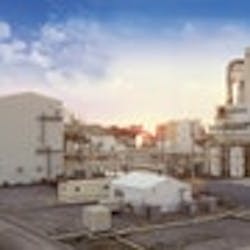Plant Pares Water Use and Disposal Costs
Wacker Chemical Corporation's plant in Calvert City, Ky., has dramatically reduced water use and sludge generation. The plant produces polymer dispersions and powders for use in adhesives, coatings, engineered fabrics and other applications.
For years, water treatment processes at Calvert City generated a fairly large volume of a non-toxic, non-hazardous soupy, heavy sludge containing more than 90% water. This was disposed of in an environmentally responsible manner in a nearby sanitary landfill owned by a joint venture partner. However, in February, 2008, a business reorganization took place and the joint venture was dissolved. As a result, the Calvert City plant lost access to the sanitary landfill.
Wacker then began to haul the heavy sludge to a sanitary landfill about 45 miles away. Waste trucks ran seven days a week, traveling a combined total of more than 96,000 miles annually; high fuel, labor and disposal costs were incurred.
Wacker knew it could reduce these additional costs as well as the plant's overall environmental footprint by redesigning its manufacturing operations to use less water in the first place, and by increasing the efficiency of its water treatment processes to generate smaller and dryer volumes of sludge.
To accomplish this, the company teamed up with GE Water & Process Technologies in the spring of 2008, bringing together the site and manufacturing knowhow of Wacker personnel with the water treatment expertise of GE specialists, along with advanced GE technologies. The cross-functional team included personnel from Wacker's corporate research group as well as plant staff from operations and the maintenance and environmental departments. The GE members comprised local management and corporate product and application engineers.
Together, the partners developed solutions, which, by the summer of 2010, enabled the plant to significantly enhance process efficiency. Annual water use was cut by more than 17 million gallons, leading to a 40% reduction in overall water-treatment expenses, and elimination of 11 million pounds of landfill waste each year and associated disposal costs.
These results were so striking that GE awarded Wacker its prestigious "ecomagination" Leadership Award, which honors manufacturers that significantly surpass environmental and operational goals while balancing industrial demands.
KEY TARGETS
Wacker and GE first set about identifying opportunities for point-source water reductions in manufacturing operations, with the goals of reducing the facility's overall water demand and costs, conserving local water supplies and decreasing the amount of water to be treated.
Then, the team turned to the water treatment operations. It found the most important step there was to achieve better pH control, which would maximize the effectiveness of the water treatment chemicals used (emulsion-breaking coagulants and flocculants). The team also implemented systems to enable more precise and consistent mixing, dosing and reaction times for the water treatment chemicals. Changes included new equipment for chemical feed and dosing, and alterations to treatment delivery piping to modify polymer feed points and mixing times. In addition, new online analyzers for pH and turbidity and instrumentation for solids monitoring enabled maximizing chemical feeds and operating conditions on the fly.
The team also saw potential for reducing sludge volume and weight. It evaluated various sludge-dewatering technologies and finally settled on a modification of an existing system. This did the trick, producing sludge that no longer is soupy but instead has the consistency of wet beach sand. The much smaller volume and lighter weight of the sludge have decreased transportation costs and landfill impacts significantly.
GE then provided extensive operator training to help foster an increased awareness of plant processes with respect to water use and treatment. This was the final step the team took to ensure the improvements will be realized long term.
MARY BETH HUDSON is site manager, Wacker Chemical Corp., Calvert City, Ky. D. J. LUTZ is engineering and maintenance manager, Wacker Chemical Corp., Calvert City, Ky. MIKE WOOD is senior product applications specialist for GE Water & Process Technologies, Trevose, Pa. BRANNON THOMPSON is area manager for GE Water & Power Technologies, Mayfield, Ky. E-mail them at [email protected], [email protected], [email protected] and [email protected].
